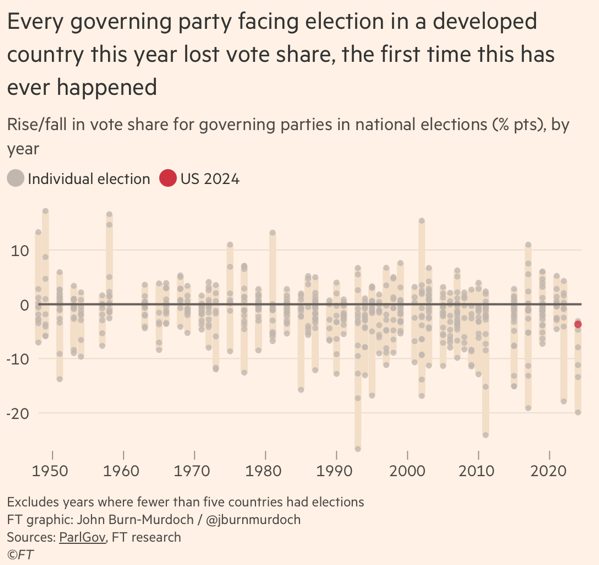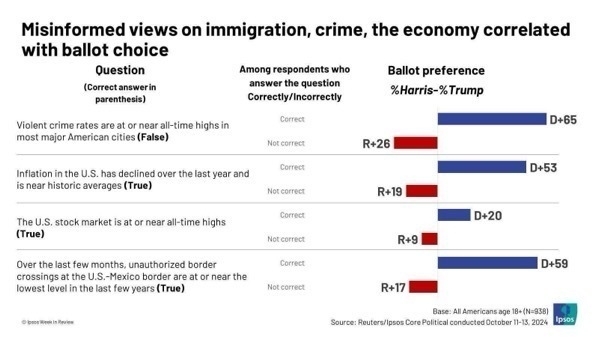Whether Jimmy Carter’s malaise, HW Bush’s recession, and the pandemic chaos in 2020, the one-term presidencies in my lifetime are all defined by economic downturn or the perception of economic downturn. 2024 appears to be no different. And this is not just an American phenomenon, but globally, incumbent parties were resoundingly rejected by voters unhappy with the status quo, both on the left (like the Democrats in the US) and the right (e.g. the Tories in the UK).
Every governing party facinig election in a developed country this year lost vote share: 
Here in the US, aside from noticeable inflation, a number of pandemic-era anti-poverty measures were simply allowed to expire.
As a result, US child poverty nearly tripled between 2021 and 2023.
I suppose that it makes sense economic opportunity is something that binds Americans together. That’s why most of us are here, isn’t it? Our United States traces our organizing principles down to a bunch of colonizers who realized that they could just settle here and take advantage of the natural bounty. That grew and expanded. The market for cheap labor started by enslaving people, but even before it was abolished, the dream of prosperity started bringing waves of immigrants into the country seeking a better life with more economic opportunity. Yes, many Americans immigrated here because of the democracy and freedom to escape repressive regimes and be able to speak, practice religion, and associate freely, but generally when we say that they came for a better life, we talk about the economic opportunity. Immigration was the engine that fed cheap labor into the system and allowed generations of immigrants come to America and build better lives for themselves and their children.
In this 2024 election, the more informed a voter was, the more likely they were to vote for Harris. Reuters/Ipsos found a correlation between believing in misinformation and voting for Trump:

Engagement with information is also tied to engagement with campaign activities. This is why the energy, enthusiasm and attendance gap at the candidates' rallies was so stark. More Harris supporters were highly engaged. Trump won the low-engagement voters by a huge margin. They’re not going to hear him speak for 3-hours. But these are the voters who are impacted by the economy and are voting for change. Even though they lived through the first Trump presidency, they still voted for “change” without scrutiny to the basic concepts of candidates' economic plans.
Informed voters are motivated by concerns like democracy and protecting people’s rights to bodily autonomy. Low-information voters are motivated primarily by their pocketbooks. Low-information voters come out for presidential elections but not midterms. So the anti-Dobbs wave that I expected to combine with anti-insurrectionist indignity to drive this election with righteous fury never existed. This is a small fire burning fiercely, but not an uncontainable wildfire. Ezra Klein: The Democratic Blind Spot That Wrecked 2024
In the swing states where the Harris campaign spent the most resources on getting its message out to voters, they performed better than in safe states where they invested fewer resources.
Everyone wants things to be better. We may have honest disagreements on what we mean by better, but if you look at the policy proposals on their own, the more popular policies are not the ones offered by the more popular candidate.
Unfortunately, becoming a well-informed voter was far more difficult than it should have been in 2024. This is all Craig’s fault. Before widespread internet use, the local news business relied on classified listings and advertising to fund journalism. Craigslist and other online job listing and marketplace platforms were all simply better and far more useful than classified ads in newspapers. The media has survived through community-supported efforts, consolidation into larger conglomerates, or patronage from billionaires like Jeff Bezos and Marc Benioff. But, at the same time, conservative activists continue to fund a vibrant and active idealogical echo chamber. Nothing with comparable scale or purity exists on the left. Conservative media continues to cast the mainstream moderate news media like the New York Times, NPR, and the Washington Post as the left-wing media.
Algorithmic social media is also imbalanced. The social network formerly known as Twitter amplifies right-wing messages and misinformation. Meta’s platforms default to minimizing political content and amplifying content that is easier to sell advertising against. Who, except from Bytedance and the CCP, knows what TikTok’s algorithm prioritizes?
The billionaires who funded the Trump campaign got great value. They will not have to contend with a potential wealth tax. Rather, they will get rewarded for their patronage and continue to fund the foundations that support the conservative thinktank and media environment.
One of Trump’s unique political skills is his ability to read an audience and give them what they want, regardless of whether he directly contradicts himself or promises the clearly impossible. However, while Trump offers many contradictory statements, after living through one Trump presidency, I think it is clear what his top priorities will be: rewarding his loyal supporters, punishing his enemies, deporting as many people as possible, and making sure that he gets a cut of the profit, all of the glory, and deflecting blame onto anyone else. The conservative donors and backers will get their tax cuts, they will get their government contracts, and they will get their conservative judges.
Tariffs are not a sound economic policy. But they are an ideal policy in a transactional presidency. Exemptions from tariffs could be used to incentivize friendly behaviors. Tariff policy can be used to punish non-compliant businesses that rely on imports. Of course, none of this is regard to the actual economic impact, which will devastate small businesses across the country.
The transactional presidency will likely apply to all aspects of the executive branch. Trump-friendly states could get disaster relief quickly. Unfriendly states could be left to suffer.
After hollowing-out the administrative state, and appointing hundreds more anti-regulatory Federalist Society judges to the federal courts, abandoning support for other democracies as a core value of international relations*, and four more years of greed writ large on the national psyche, this will never be the diverse, entrepreneurial, and free country that it could be. Where we attract talent from all over the world to make a good life for everyone in this country.
Any failure to make intelligent choices about policy will create disastrous long-term effects. In particular, not addressing climate change will cause more people to suffer from natural disasters. Without intelligent and empowered regulators, an administration willing to provide opportunity to seek profit by working with AI accelerationists seems like the mostly way that AI could lead to problems. However far away true AGI may be, we are much closer to automated decision-making that could have devastating effects if used without thoughtful intent, oversight or understanding. Further eroding the public health system will only hasten the next pandemic and ensure that it is even more destructive than Covid-19.
Defunding education is likely to mean that lower tax states will struggle to fund public schools. Public education was crucial to building the strong middle class of the 20th century. As a result, it’s plausible to see a scenario where high school education is made optional and more teenagers are sent out into the workforce to take the low-wage work that were vacated as a result of Trump’s mass deportations. That’s also good for ensuring a continuing supply of Republican voters in the future.
Trump supporters see a need to Make America Great Again because everyone who is not a billionaire is being left behind by society in some way. But the Trump plans will not help more Americans get ahead. Instead, these plans try to address this pain by inflicting it on others. Instead of feeling better through success, feel better only by knowing that someone else is feeling worse. As people, we should all try to do things to make each other’s lives better that way we all win. Instead of healing the world, they are merely passing pain down the chain to the more vulnerable. Immigrants and transgender people are the most obvious targets for these actions. Local law enforcement will likely feel empowered and encouraged to act with more violence and cruelty, even if such actions contravene the official state and local policy. The most vulnerable among are the easiest targets and will suffer the most.
This is the future that we have chose. May the odds be ever in your favor.
Some other good analysis:
emptywheel: Two Elections: “The rules were that you guys weren’t going to fact-check”
Daniel Drezner: My One Post-Mortem About the 2024 Election

